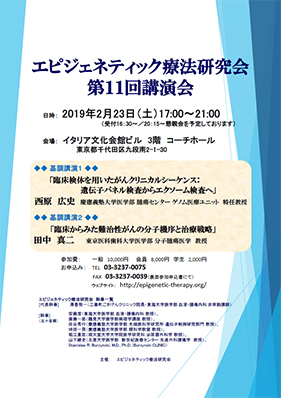第11回講演会

- 日程
- 2019年2月23日(土)
- 会場
- イタリア文化会館ビル 3階 コーチホール
- 来場者数
- 約30名
- 開催報告
-
-
代表幹事 澤登雅一
-
今回の学術講演では、最先端のがん治療に関して、2名の著明な先生にご登壇いただきました。いずれの講演でも “precision”というキーワードがありました。がんの多様性が治療抵抗性の原因であり、これらに対応するには、個々のがんの特徴に合わせ、治療も多様・個別である必要があります。
西原先生には、がん遺伝子パネル検査の現状と将来の展望についてお話をいただきました。
遺伝子パネル検査は、個々のがんについて遺伝子を網羅的に解析することで、個々のがんに適した分子標的薬を見つける検査で、実際に適合する薬剤が見つかり、治療効果が得られていることもご発表いただきました。
田中先生には、がんが多様性であるがゆえに、臨床検体を用いた研究が大切であること、また、とくに難治性がんの代表である肝臓がん・膵臓がんについて、遺伝子学的サブタイプと、サブタイプに基づいた治療の可能性についてお話をいただきました。
本研究会が立ち上げられた2010年には、限られたがん種に対してのみ分子標的薬が適応でありましたが、免疫チェックポイント阻害剤の登場、まもなく保険適応となる予定の遺伝子パネル検査のルーチン化により、ようやく真の個別化治療に近づいてきた感があります。
-
東海大学医学部 血液・腫瘍内科 教授 安藤潔
-
プレシージョンメディシンという言葉を聞くことが多くなりました。2000年にヒトの遺伝子が解読されたことの具体的な成果が、がんのプレシージョンメディシンに結実しています。そしていよいよ今年から日本でも「がんゲノムパネル検査」が保険適応されるのです。今回の講演会ではこの領域の日本のリーダーであるお二人の先生から講演をいただきました。
西原先生は慶應大学病院で行われている試みを具体的に紹介いただきました。外科手術で得られたがん組織を用いて網羅的に遺伝子配列を決定し、適応可能な分子標的薬を探し出す試みです。免疫治療を含めた新たな治療方法の可能性が広がります。
田中先生は難治性のがんの代表である、すい臓がん、肝臓がんの遺伝子解析の結果を紹介していただきました。治療法の少ないこれらのがんでも今後の展開が期待されます。
さて、エピジェネティック療法と「がんゲノムパネル検査」の関係ですが、実はエピジェネッティックに関わる遺伝子もパネルの中には多く含まれています。結果によってはエピジェネティック療法の適応となるがん種が今後より詳細にわかってくるのではないかと期待しています。
-
- 講演内容
-
-
基調講演1
「臨床検体を用いたがんクリニカルシーケンス:遺伝子パネル検査から全エクソーム解析へ」
西原 広史(慶應義塾大学医学部 腫瘍センター ゲノム医療ユニット 特任教授)座長:安藤 潔(東海大学医学部 血液・腫瘍内科 教授)
-

慶應義塾大学では、三菱スペースソフトウエア(MSS)社と共に、高精度検査として“がん遺伝子パネル検査”「PleSSision検査」を開始している。この検査は、最大160遺伝子を標的としたアンプリコンシーケンスであり、通常の病理診断に用いられた生検の残余FFPE(ホルマリン固定パラフィン包埋)ブロックでも検査が実施可能である。腫瘍組織から採取したがん細胞由来の遺伝子と、血液から採取した正常遺伝子を比較することで、腫瘍細胞特異的ながん遺伝子の異常(変異、増幅、欠失など)に加えて、コピー数変化及びMSI, mutation burdenの検出を行う。約30か月間で334名の検査を実施し、腫瘍化の原因となるActionable遺伝子異常の検出率は92%、治療薬の選択に直結するDruggable遺伝子異常の検出率は59%であった。また、Genotype-matched treatmentを実施した患者は全体で13%に登り、奏効率は38%、病勢制御率は78%と治療の高い有効性が示された。さらに我々は、FFPE検体を用いて約2万遺伝子をカバーするWhole exome sequence検査(PleSSision-Exome)を開発し、必要最低限のDepth設定やDNA量の確認と共に、既存のターゲットシーケンスとの整合性の検証を行っている。本講演では、臨床検体を用いたがんゲノム解析の実例を示しつつ、全エクソーム解析の有用性について述べる。
-
基調講演2
「臨床からみた難治性がんの分子機序と治療戦略」
田中 真二(東京医科歯科大学医学部 分子腫瘍医学 教授)座長:山下 継史(北里大学医学部 新世紀医療開発センター 先進外科腫瘍学 教授)
-

多様性は「がん」の本質的特徴であり、難治性となる要因の1つである。生体内において「がん」という疾患は癌細胞と宿主個体との相互関係にあり、微小環境、免疫反応を含む多様な因子群が複雑に作用している。即ち、疾患としての癌-宿主相互関係を包括的に解析するためには、癌細胞の多様性のみならず宿主作用の多様性も同時に把握することが必須であり、臨床検体を用いた研究が高いプライオリティを持つことを示している。近年の遺伝子解析技術の急速な発展によって、多様な分子サブタイプが存在することが明らかとなり、サブタイプに基づいた癌ゲノム医療への応用が期待されている。さらに免疫チェックポイント阻害剤の登場により、複合免疫療法への期待が高まっている。我々はがん幹細胞による多様性解析に加えて、正常免疫下多重ゲノム編集解析によって、どのサブタイプに、どのような組み合わせで、どのタイミングが最適であるかを明確にし“precision immunotherapy”の開発を目指している。
-
The 11th symposium
- Speech
-
-
Special Lecture1
“Cancer clinical sequencing using clinical specimens: from gene panel testing to whole-exome sequencing”
Hiroshi Nishihara, Genomics Unit, Keio Cancer Center, Keio University School of Medicine -

The “cancer gene panel testing” [PleSSision testing], which is a highly accurate test, was developed by Keio University, together with Mitsubishi Space Software Co., Ltd. (MSS). This test involves amplicon sequencing targeting a maximum of 160 genes, and can be performed even on residual formalin-fixed paraffin-embedded (FFPE) biopsy blocks that have been used for usual pathological diagnosis. Genes in the cancer cells collected from tumor tissue specimens are compared with normal genes in the blood to detect copy number changes, microsatellite instability (MSI) and mutation burden, in addition to tumor cell-specific abnormalities (mutations, amplifications, deletions, etc.) in oncogenes. A total of 334 patients underwent the test over a period of approximately 30 months, and abnormalities in actionable genes causing tumorigenesis were detected in 92%, and abnormalities in druggable genes leading directly to the selection of therapeutic agents were detected in 59%. In addition, as many as 13% of all patients received genotype-matched treatment, which proved highly effective, with a response rate of 38% and disease control rate of 78%. Furthermore, we developed whole-exome sequencing testing (PleSSision-Exome) covering approximately 20 000 genes using FFPE specimens; we determined the minimum required depth setting and DNA amount and tested consistency with existing target sequences. In this talk, I shall present the usefulness of whole-exome sequencing, while showing examples of cancer genome analysis performed using clinical specimens.
-
Special Lecture2
“Molecular mechanisms and therapeutic strategies for refractory cancer from a clinical point of view”
Shinji Tanaka, Department of Molecular Oncology, Tokyo Medical and Dental University -

Diversity is an essential feature of “cancer” and is one of the factors that causes refractoriness of cancers to treatment. In the case of “cancer,” cancer cells and host individual cells interact mutually, and diverse factors, including the microenvironment and immune responses, act in a complex manner in vivo. Therefore, for comprehensive analysis of cancer-host interactions, it is essential to understand not only the diversity of cancer cells, but also the diversity of the host reactions, and high priority should be given to research using clinical specimens. Rapid development of gene analysis technologies in recent times have revealed the presence of diverse molecular subtypes, which are expected to be applied to cancer genomic medicine. Furthermore, the emergence of immune checkpoint inhibitors has increased expectations for combination immunotherapy. We are engaged in the effort to develop “precision immunotherapy” by clarifying which combinations and what timings are optimal for which subtypes through diversity analysis using cancer stem cells and multiplex genome editing analysis under normal immunity.
-







